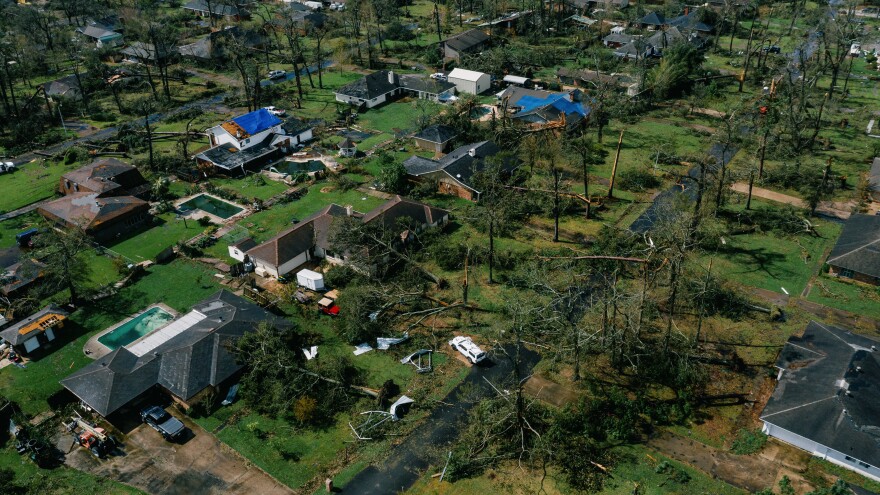In front of City Hall, a crew shovels through debris, clearing a path to the front door. Bricks and broken glass from office buildings litter downtown. Gas station awnings have been flipped on their sides.
The best news in Lake Charles, La., in recent days: an announcement that 95% of the streets here are just now navigable, nearly a week after Hurricane Laura tore through the region.
"We absolutely need our American brothers and sisters to realize that a great American city had a major blow," Mayor Nic Hunter says. "I am begging, I am pleading for Americans not to forget about Lake Charles."
At the beginning of hurricane season, and in the middle of an election year, a global coronavirus pandemic, protests over police violence, and raging wildfires, Hunter fears his decimated city of 80,000 will be left to recover on its own with the nation already overwhelmed.
It could cost as much as $12 billion to repair damage from the storm in Louisiana, and the local utility company says tens of thousands of people will be without electricity for weeks – the city hums with the sound of generators, a crucial lifeline in the blazing summer heat.

Hunter stayed home as Hurricane Laura, the most powerful storm to hit Louisiana since 1856, spun through the town with its 150-mph winds. Now he spends his days driving around his damaged city, checking in with residents such as Winston Andrews, who also didn't evacuate.
"This is bad, terrible right here. Anyone that left don't want to see what's going on right now," Andrews says. "Lake Charles will never be the same again."
He tells the mayor his neighbors say that evacuating now could make things worse – fears of coronavirus surges meant officials have limited the number of shelters available so people are driving hundreds of miles in hopes of finding a rare open hotel room.
"They get to New Orleans, they got nothing for them," Andrews says. The mayor shakes his head. With so many people in need, all he can really do is make sure Andrews has a generator (he does) and that it's working safely. At least half of the 19 deaths from the storm are believed to be from carbon monoxide poisoning.
Hunter steps over a tangle of downed power lines to check on Andrews' neighbor in this underserved neighborhood north of Interstate 10.
"There's going to be a lot of people without insurance in these areas, and that's where we're hoping a lot of the nonprofits and FEMA will come through," Hunter says. According to the Federal Emergency Management Agency, more than 50,000 claims have already been filed in the region, but this is just one of many expensive disasters straining federal coffers.

Down the street, Gwendolyn Smith is headed out to try and find a tarp to fix the holes in her roof. With many buildings in the city damaged, plastic sheeting is scarce. Two big trees fell over onto the house she lives in with her 15-year-old grandson, Qwentin Smith. They're hoping her landlord who lives in California will fix the damage soon.
"When it rains, it just pours down like a faucet," Gwendolyn Smith says. Her car has a faulty transmission, so they stayed put during the storm. Now, Smith, who is a security guard at a city park, is struggling to afford gas for a generator. She's spent $110 in just the past three days.
The house has no power and just a trickle of water in the kitchen and bathroom. Smith says she tried to register with FEMA, but without an Internet connection she is unable to finish her application for aid.
"They ain't doing nothing to help us," Qwentin says. His ninth-grade classes were canceled ahead of the storm. Now he is helping neighbors clean up debris. "We're just surviving."
The Smiths are desperate for information — about when the power might come back on, when they'll be able to return to work and school, and where they can shelter in the meantime.
"The best we can do is get on top of the car or on top of the house to get service at night, when it's not that hot," Qwentin says.
It's risky with the roof, but every night he climbs up, holds his cell phone to the sky and tries to get some word about what might be next for his family, and for Lake Charles.
Copyright 2021 NPR. To see more, visit https://www.npr.org.



